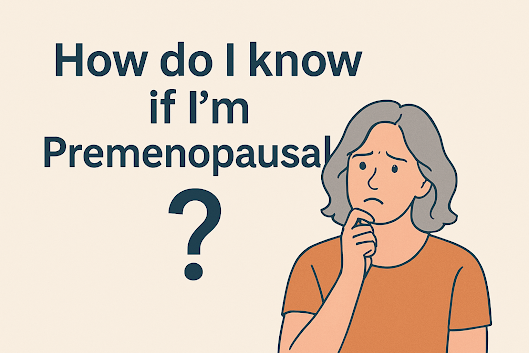HOW DO I KNOW IF I'M PREMENOPAUSAL
Perimenopause—also known as the menopausal transition—is the stage in a woman’s life when the ovaries slowly begin producing less estrogen. This transition continues until menopause, the point at which ovulation stops entirely. Estrogen decline becomes more rapid during the final one to two years of this phase, often triggering noticeable menopause-like symptoms.
When Does Perimenopause Begin?
Typically, perimenopause starts between 8 to 10 years before menopause sets in. For most, this shift begins in the mid-40s, but some women might notice changes as early as their 30s.
If menopause occurs before the age of 40, it’s considered premature menopause. This early transition may result from medical conditions or procedures. If no medical or surgical explanation is found, it may be diagnosed as primary ovarian insufficiency.
Factors that can lead to early menopause include:
-
Use of tobacco products
-
Family history of early menopause
-
Prior chemotherapy or radiation treatments
-
Surgical removal of the uterus or ovaries
Perimenopause vs. Premenopause: What's the Difference?
Though often confused, these terms refer to different stages:
-
Premenopause spans the time from your first menstrual cycle up until perimenopause begins.
-
Perimenopause refers to the hormonal transition that eventually leads to menopause.
How Long Does Perimenopause Last?
On average, perimenopause continues for about 4 years. However, it can be as brief as a few months or extend for up to a decade. You're considered to have entered menopause once you’ve gone a full year without menstruating.
Common Symptoms of Perimenopause
This phase may bring several physical and emotional changes, including:
-
Hot flashes and night sweats (vasomotor symptoms)
-
Sore or tender breasts
-
Intensified PMS
-
Reduced libido
-
Fatigue
-
Irregular menstrual cycles
-
Vaginal dryness or discomfort during intercourse
-
Urinary incontinence or frequent urination
-
Mood fluctuations
-
Difficulty sleeping
-
Short-term memory lapses
-
Poor concentration
Are These Symptoms Normal?
Irregular periods are a hallmark of perimenopause. However, unusual bleeding patterns could signal other health issues. Consult your doctor if you experience:
-
Exceptionally heavy periods or clotting
-
Prolonged menstruation
-
Spotting between periods or after intercourse
-
More frequent periods
Such issues could be linked to hormonal imbalances, medications, fibroids, or—less commonly—cancer.
Fibroids, which may worsen during perimenopause, often cause heavy bleeding, pelvic pressure, frequent urination, lower back pain, and anemia.
Can You Test for Perimenopause?
Doctors typically diagnose perimenopause by evaluating your symptoms. Hormone levels fluctuate during this time, so a single blood test may not provide definitive results. Multiple hormone tests over time may offer better insights.
Over-the-counter home tests that check follicle-stimulating hormone (FSH) levels are available, but experts caution against relying solely on them. Your medical history and current health play crucial roles in diagnosis.
Is Pregnancy Still Possible?
Yes, you can still conceive during perimenopause, even though fertility declines. If avoiding pregnancy is a goal, it’s important to continue using contraception until menopause is confirmed (12 consecutive months without a period).
Conversely, for women hoping to conceive during their late 30s or 40s, fertility treatments may improve their chances.
Managing Perimenopause Symptoms
Although perimenopause is a natural transition and not a condition that needs curing, several treatments can ease discomfort:
Medical Options
-
Low-dose birth control pills: Regulate hormones and reduce hot flashes.
-
Hormonal contraceptives: Patches, rings, or injections may also be effective.
-
Antidepressants: Low doses can stabilize mood and reduce hot flashes.
-
Estrogen therapy: Available as patches, pills, creams, or gels to balance hormones.
-
Gabapentin: A seizure medication shown to help some women with hot flashes.
-
Vaginal creams or lubricants: Soothe dryness and ease discomfort during sex.
Hormone Therapy (HT)
If you pursue hormone replacement therapy, it’s usually recommended within 10 years of menopause onset and limited to less than five years due to potential risks. These include:
-
Heart attack
-
Stroke
-
Blood clots
-
Uterine cancer
-
Gallbladder disease
-
Certain breast cancers
Lifestyle and Home Remedies
Simple lifestyle adjustments can make a big difference:
-
Regular physical activity
-
Healthy, balanced diet
-
Avoiding alcohol, caffeine, and smoking
-
Consistent sleep schedule
-
Managing stress through relaxation techniques
-
Staying hydrated and maintaining a healthy weight
-
Using calcium-rich foods or supplements
-
Taking multivitamins if recommended
Talk to your healthcare provider about low libido or discomfort during intimacy. Counseling or lubricants may help.
Signs That Perimenopause Is Ending
You may be nearing menopause if your symptoms intensify and you haven’t had a period for several months. Menopause is officially reached after 12 straight months without menstruation.
Key Takeaways
-
Perimenopause marks the transition as estrogen production declines.
-
It usually begins in your 40s but may start earlier.
-
The phase typically lasts around 4 years but varies greatly.
-
Many symptoms are normal, but unusual bleeding should be checked by a doctor.
-
Treatment options range from lifestyle changes to hormone therapy.
-
You can still get pregnant during perimenopause, so birth control is important if you’re not trying to conceive.
FAQs About Perimenopause
What are the earliest signs of perimenopause?
A noticeable change in your menstrual cycle, such as missed or irregular periods, is often the first sign.
At what age does perimenopause typically begin?
Most women enter perimenopause between ages 40 and 44, but it can start in the 30s.
What are three common symptoms?
Mood changes, low libido, and trouble focusing are frequently reported.
What are the stages of perimenopause?
-
Early stage: Starts in your 30s or early 40s with subtle symptoms.
-
Late stage: Usually occurs in your late 40s to early 50s and is marked by more intense changes and the approach of menopause.
Dr.Ifrah Hassan Hilaac.









0 Comments